| Name | Image | Address | Type | Summary |
|---|
| Football Museum Bucharest | N/A | Strada Gabroveni 24, Old Town | First football museum in Eastern Europe | The Football Museum Bucharest, the first of its kind in the country and the only museum dedicated to football in Eastern Europe. The Football Museum stretches over 5 floors on Gabroveni Street in Bucharest’s Old Town, an area that gets a lot of foot traffic from tourists. It features a large collection of jerseys, balls, and medals connected to the history of football, many of them brought to the Romanian public for the first time ever. More than this, the museum has lots of interactive and multimedia experiences, e.g.: visitors can experience how to be Sports commentators, goalkeeper, etc. |
| Casa Memorială „Tudor Arghezi” |  | Strada Mărțișor 26 | Memorial house | The house where the family of poet Tudor Arghezi (1880–1967) settled, starting with 1930 |
| Ferestroika | N/A | Strada Ion Manolescu | Anthropology | An apartment furnished and decorated exactly like one of the Ceaușescu period, aiming to teleport you back to the 1980s |
| Museum of Senses |  | Bulevardul General Vasile Milea 4 | Sense | The museum also has a collection of 40 exhibits, based on optical illusions, including stereograms, a nail bed, an upside-down room, a kaleidoscope, an Ames room, a room that seems infinite, and others. It is located inside the AFI Cotroceni mall, in the area where there is also a small roller coaster |
| National Museum of Romanian Aviation |  | Șoseaua Fabrica de Glucoză 2-4 | Aeronautic | Moments from the history of Romanian aviation, the achievements in the aeronautical field, the major contribution that Romanians have had over time to the progress of world aviation, documents, models, and photographs related to the history of Romanian and world aeronautics |
| Museum of the National Bank of Romania [ ro ] | 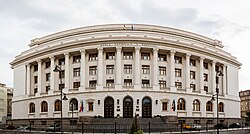 | Strada Doamnei 8 | Numismatic | It is one of the most valuable numismatic collections in Romania covering a period of over two and a half millennia, being exhibited among others the oldest coin minted in Romania today, and the smallest paper money printed in Romania |
| Museum of Romanian Railways [ ro ] |  | Calea Griviței 193B | Railway | Among the exhibits is the reconstituted set of the train that made its first journey on a railway in Romania, in October 1869 |
| Museum of Art Collections |  | Calea Victoriei 111 | Art | Works of modern Romanian art, Romanian folk art, paintings, graphics, sculpture, and decorative art of Western or Eastern origin |
| Curtea Veche Museum [ ro ] | | Strada Franceză 25 | History | The remains of the former Bucharest Citadel, which have withstood natural disasters and bad weather |
| Frederic Storck and Cecilia Cuțescu-Storck Art Museum |  | Strada Vasile Alecsandri 16 | Art and memorial house | The home and studio of sculptor Frederic Storck and painter Cecilia Cuțescu-Storck, also including significant works by Frederic Storck's father, Karl Storck and others. |
| Nicolae Minovici Museum of Popular Art |  | Strada Doctor Nicolae Minovici 1 | Art and memorial house | Within the museum can be admired several types of Romanian folk art pieces from all over Romania: icons, ceramics, fabrics, wooden objects, traditional musical instruments; and a documentary fund on the activity of Nicolae Minovici |
| Museum of Recent Art |  | Bulevardul Primăverii 15 | Art | A permanent collection with the most representative Romanian works of art made from the 1960s until today |
| Vasile Grigore Art Museum [ ro ] | N/A | Strada Maria Rosetti 29 | Art | It has exhibition spaces on two levels where the pieces are arranged in five rooms, representing seven large sections (painting, graphics, sculpture, Romanian folk art and European, Oriental, and Far Eastern decorative art). |
| Dumitru Minovici Museum of Old Western Art [ ro ] |  | Strada Doctor Nicolae Minovici 3 | Art and memorial house | Inside you can admire various works of art, such as: stained glass windows from the XVI - XVII centuries, engravings, paintings, rare books, tapestries, carpets, and furniture |
| George Severeanu Museum [ ro ] |  | Strada Henri Coandă 26 | Art, archaeology, numismatic, and memorial house | The museum is housed in the house that belonged to the radiologist George Severeanu [ ro ] and his wife Maria. In the museum is exhibited the numismatic and antiquities collection of the Severeanu spouses, which includes 11 ancient Egyptian antiquities, Greek and Etruscan vessels, Tanagra statuettes, Roman glassware and jewelry, İznik pottery, medieval documents, many coins (numismatics), and more |
| Gheorghe Tattarescu Museum [ ro ] |  | Strada Domnița Anastasia 7 | Art and memorial house | It is hosted in the house where he lived and created for 40 years. Tattarescu and Theodor Aman were the founders of the School of Fine Arts in Bucharest |
| Ligia and Pompiliu Macovei Museum |  | Strada 11 Iunie 36-38 | Art and memorial house | It is located in the private residence of the donors, in a building built in the early twentieth century, in French Eclectic style, the collection consists of works of art, represented by works signed by artists such as Theodor Pallady, Lucian Grigorescu, or Nicolae Tonitza |
| Dimitrie and Aurelia Ghiață Museum [ ro ] | N/A | Strada Doctor Louis Pasteur | Art and memorial | Memorial collection of paintings and drawings, as well as documents belonging to the painter Dumitru Ghiață (1888–1972), along with a large suite of decorative works of art, textiles and tapestry cards made by the artist's wife |
| Little Paris Museum |  | Strada Lipscani 41 | Anthropology | The museum consists of several rooms with objects like those that were in the houses in Bucharest in the interwar period (when it was called Little Paris), trying to recreate the interiors specific to the period. |
| National Military Museum | 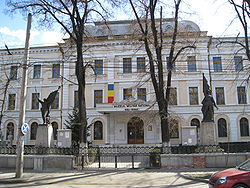 | Strada Mircea Vulcănescu 125-127 | Military | |
| Bucharest Museum [ ro ] |  | Bulevardul Ion C. Brătianu 2 | Anthropologic | The museum is housed in the Șuțu Palace. On the ground floor there are several rooms for temporary exhibitions. The collection includes clocks, old pictures, Neolithic art, old maps of Bucharest, furniture, and more |
| National Museum of Old Maps and Books [ ro ] |  | Strada Londra 39 | Art and history | The museum's collection includes over 1000 maps, engravings, drawings, lithographs, as well as a series of objects specific to the museum's theme. The exhibits are arranged in a suite that respects the scientific side harmoniously combined with the artistic one, seeking to highlight the historical evolution of the cartographic achievements throughout the world and, especially, those that relate to space |
| Museum of Romanian Literature [ ro ] | 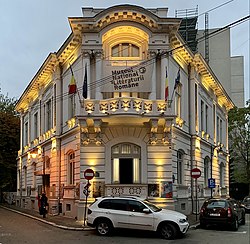 | Strada Nicolae Crețulescu 8 | Literature and memorial | The museum's collection consists of manuscripts and the first editions of important books from Romanian literature, and objects that belonged to the great writers, including furniture |
| National Museum of Firefighters |  | Bulevardul Ferdinand I 33 | |
| Dimitrie Gusti National Village Museum |  | Șoseaua Pavel D. Kiseleff 28-30 | Anthropology and architecture | The museum is composed of an area where there are many peasant houses and churches from various areas of Romania. Just like at the Romanian Peasant Museum, on the occasion of holidays such as Easter, Christmas, and the days of some saints, fairs are organized in which various artisans sell stalls on the streets of the museum of peasant art or home-made sweets. |
| Romanian Peasant Museum |  | Șoseaua Pavel D. Kiseleff 3 | Anthropology | The collection includes pottery, folk clothing, interior fabrics, furniture, and more. just like at the Dimitrie Gusti National Village Museum, on the occasion of holidays such as Easter, Christmas, and the days of saints, fairs are organized in which various artisans sell at stalls on the streets of the museum of peasant art or home-made sweets. |
| National Cotroceni Museum |  | Bulevardul Geniului 1 | History | Since 1991, the historical body of the palace has been open to visitors, becoming the Cotroceni Museum. In 2009, after extensive restoration works, the Cotroceni Church was also included in the museum route |
| National Museum of Art of Romania | 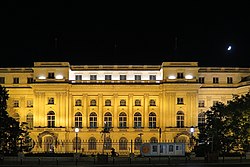 | Calea Victoriei 49-53 | Art | It includes one of the largest collections of paintings in Romania, and medieval art (mainly Romanian) |
| National Museum of Contemporary Art |  | Strada Izvor 2-4 (part of the Palace of Parliament) | Art | Contemporary art, housed in a wing of the Palace of Parliament |
| Geology Museum |  | Șoseaua Pavel D. Kiseleff 2 | Geology | The permanent exhibition consists of 14 basic exhibitions and contains approximately 7,700 exhibits out of a total of 70,000 samples in the museum's scientific collections. |
| National Museum of Romanian History | 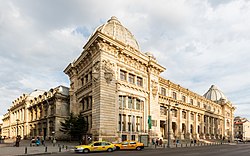 | Calea Victoriei 12 | History | The most important museum of history and archeology in Romania, both by size (developed area) and by heritage |
| Grigore Antipa National Museum of Natural History |  | Șoseaua Pavel D. Kiseleff 1 | Natural history | The museum's collection consists of over 2 million pieces, grouped into different collections zoology, paleontology, minerals, rocks |
| Cantacuzino Palace | 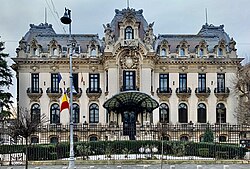 | Calea Victoriei 141 | Memorial house | Among the objects in the museum that belonged to the composer George Enescu are his first violin, which he received as a gift at the age of four, as well as some of the medals he obtained as a result of his contribution to World War I |
| Dimitrie Leonida Technical Museum |  | Strada General Candiano Popescu 2 | Technical | It was founded in 1909 by Dimitrie Leonida, inspired by the Deutsches Museum |
| Romanian Kitsch Museum [ ro ] |  | Strada Soarelui | Kitsch | The museum's collection includes ceramic figurines (known in Romanian as bibelouri) from the period of Nicolae Ceaușescu, glass fish, carpets, and various other types of kitsch |
| Theodor Aman Museum |  | Strada C. A. Rosetti 8 | Art and memorial house | It includes a memorial collection of paintings, graphics and sculpture, working tools, furniture, and other objects that belonged to the painter and graphic artist Theodor Aman (1831-1891) |
| Theodor Pallady Museum |  | Strada Spătarului 22 | Art | The museum has some remarkable paintings by the great Romanian painter Theodor Pallady, as well as a batch of over 800 drawings (landscapes, nudes, portraits, interiors), representative of Pallady's Parisian period. They are exhibited periodically in thematic series |
| Age Museum [ ro ] |  | Calea Victoriei 151 | Anthropology and decorative arts | The theme of the museum is the evolution of the relations between the generations in the last three hundred years, for the Romanian urban environment, having Bucharest as a case study. It is a projection of what a day in our life would have looked like, from the 18th century to the present. And especially, about how this symbolic day in history has evolved with each generation. The museum's collection includes clothes, various examples of decorative arts, furniture, household items, collections of porcelain, glass and metals, things that reflect the evolution of technology, home music, etc., through them being presented the evolution of everyday life |
| Victor Babeș Museum |  | Strada Andrei Mureșanu 14A | Memorial house | The museum is housed in the house of bacteriologist and morphopathologist Victor Babeș, the collection containing things that belonged to him |
| Zambaccian Museum |  | Strada Zambacian 21A | Art and memorial museum | The collection includes paintings, sculptures, graphics, and furniture. Among them is a collection of works by Romanian artists, including a portrait of Krikor H. Zambaccian [ ro ], painted by Corneliu Baba, as well as works by several French impressionists |
| Bucharest Observatory |  | Bulevardul Lascăr Catargiu 21 | Observatory | The only public observatory in Bucharest. The collection includes several refracting telescopes and astronomical telescopes |
| Palace of the Parliament |  | Strada Izvor 2-4 | Administrative building | It is the heaviest building in the world, the third largest administrative building in the world, and the most expensive administrative building in the world. It is the seat of the Parliament of Romania and offers guided tours. In addition, it houses the National Museum of Contemporary Art and the Museum of the Palace. |
| Primăverii Palace [ ro ] |  | Bulevardul Primăverii 50 | Memorial house | The residence in Bucharest of Nicolae and Elena Ceaușescu |
| Jewish Museum |  | Strada Mămulari 3 | Jewish museum | An important archive of the history of Romanian Jews, housed in a well-restored former synagogue. Includes paintings of and by Romanian Jews, and costumes from the State Jewish Theater. |
|






































